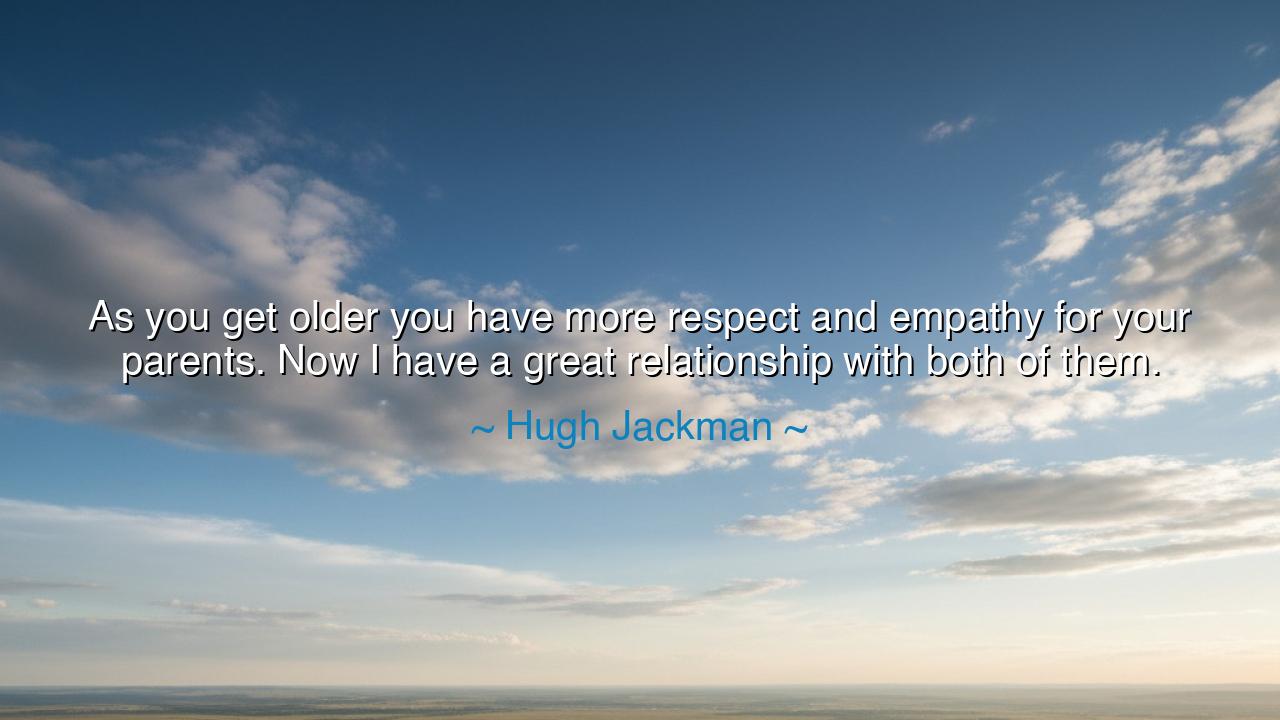
As you get older you have more respect and empathy for your
As you get older you have more respect and empathy for your parents. Now I have a great relationship with both of them.






“As you get older you have more respect and empathy for your parents. Now I have a great relationship with both of them.” Thus spoke Hugh Jackman, the actor beloved not only for his craft but for the quiet wisdom with which he views the world. These words, though simple, contain a truth deep and universal — that time itself is a teacher, and that age softens the heart even as it sharpens the mind. Through the long journey of life, one comes to see what once was hidden: the sacrifice, the struggle, and the unspoken love of those who raised us.
When we are young, we see our parents as giants — strong, flawed, sometimes confusing beings who stand between us and the freedom we crave. We measure them against ideals, and we find them wanting. We see their rules, but not their reasons; their failures, but not their fears. Youth is bold and impatient, blind to the burdens carried by those who walk before it. But as the years turn and we, too, shoulder responsibility — as we work, love, and care for others — our eyes are opened. We begin to see what it means to give without rest, to worry without end, to love without thanks. And in that recognition, empathy is born.
Hugh Jackman’s words spring from the soil of personal experience. His parents separated when he was but a child — a wound that shaped his early years. Yet as he grew older, as life tested his own heart with marriage, fatherhood, and fame, he began to see his parents not as figures of blame or mystery, but as human beings — imperfect, yes, but striving to do their best in a world that tests every soul. It was only through time, reflection, and maturity that he could say, “Now I have a great relationship with both of them.” In his journey, we glimpse a universal transformation: that forgiveness is the fruit of understanding, and understanding the gift of age.
This truth echoes through the ages. Consider Marcus Aurelius, the philosopher-king of Rome, who wrote in his Meditations of the lessons inherited from his family — from his grandfather, restraint; from his father, humility; from his mother, piety and generosity. Only in his maturity did he recognize how these quiet virtues had shaped him. Or look to the life of Abraham Lincoln, who, though born to humble parents on the frontier, spoke later in reverence of the wisdom his mother imparted before her death: “All that I am, or hope to be, I owe to my angel mother.” Time had taught him gratitude; hardship had taught him understanding.
For truly, empathy grows from experience. To respect one’s parents is not merely to honor them for their authority, but to perceive their humanity — to see that they, too, were once young, uncertain, and full of dreams. They loved, they lost, they sacrificed so that we might rise higher than they could. As children, we inherit their labor without knowing its cost; as adults, we begin to count that cost in our own toils. Only then do we understand that their sternness was protection, their silence was worry, their rules were love in disguise. Thus, what was once resentment becomes reverence, and what was once distance becomes connection.
Hugh Jackman’s quote, though spoken in modern times, carries the ancient spirit of filial piety — the reverence for one’s parents that has been honored across civilizations. The Chinese sage Confucius taught that to respect one’s parents is the foundation of all virtue, for it is in that relationship that one first learns duty, compassion, and gratitude. The same wisdom flows through every culture: that to understand one’s parents is to understand life itself, for they are our first teachers in joy, in pain, and in perseverance.
Therefore, O listener, take this teaching to heart: do not wait for age to awaken your empathy. Seek it now, while time still allows you to speak the words your heart will one day long to say. Look upon your parents not with judgment, but with curiosity; not with distance, but with compassion. Ask their stories. Learn their struggles. See the people they were before they were guardians, and in doing so, you will see the thread of your own soul woven through theirs.
For as Hugh Jackman reminds us, respect and empathy are not gifts given by youth, but wisdom earned by growth. When we understand our parents, we honor not only them, but the generations that shaped them, and the generations we will shape in turn. Thus, the circle of love completes itself: the child becomes the parent, the parent becomes the teacher, and through empathy, all are made whole. Let this truth guide your heart — to forgive more freely, to love more deeply, and to live with the humble knowledge that understanding is the purest form of love.






AAdministratorAdministrator
Welcome, honored guests. Please leave a comment, we will respond soon